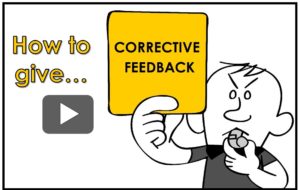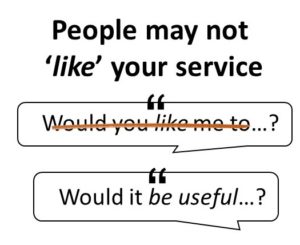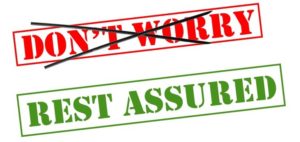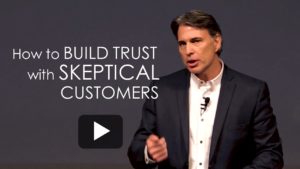Know this one tip about motivating young employees
Attending one of my seminars on "Leading a Customer Focused Team", a manager lamented, "Young employees are just not motivated to work as hard as we did at that age." Actually, young people are indeed motivated and connected; just not to what most managers talk about. Young employees are sometimes referred as generation Y. A more helpful description is generation why. They want to know how the organization will have a positive impact on society. And how the task they are asked to perform will benefit their own careers. That's why, at my Trusted Advisor seminars, we begin by discussing why choosing words that earn trust and enhance customer experience will make their job easier, reduce conflict, and enhance their personal relationships. Young folks have no problem at all working hard and implementing new approaches. They just need to know how it's also in their own best interests.
How to Collect from Late Paying Customers
Nine tips for getting paid without creating hard feelings
 Ever experience the awkwardness of having to call a customer to remind them to pay their bill? You walk a fine line of diplomacy. Being a pushover won’t get the customer’s attention. Being too pushy can offend risking losing not only money that’s due, but future business as well. Most of the training I do is on choosing words that enhance trust and differentiate your service to make price less relevant. You can use these same trust building principles to gain cooperation with customers who aren’t paying. Consider these nine tips…
Ever experience the awkwardness of having to call a customer to remind them to pay their bill? You walk a fine line of diplomacy. Being a pushover won’t get the customer’s attention. Being too pushy can offend risking losing not only money that’s due, but future business as well. Most of the training I do is on choosing words that enhance trust and differentiate your service to make price less relevant. You can use these same trust building principles to gain cooperation with customers who aren’t paying. Consider these nine tips…
1. Do your homework
Start by gathering details about the invoice and about how much overall business the customer does with you. Any large volume customer isn’t going to be happy about receiving a collection call over a relatively small invoice. In fact they may rethink continuing to do business with you. On the other hand, a first time customer with a large overdue bill should be contacted sooner rather than later. When it comes to collecting, it makes sense to give long term customers special consideration.
2. Begin with a courtesy email
The first reminder can be a friendly email sent soon after payment is due. Keep the tone light and conversational: “Pat, I was looking through our receivables and noticed we haven’t received a payment yet on this invoice. I want to make sure you did indeed receive it and there’s nothing you need from our end. Thanks.”
3. Stand up for yourself
If the email doesn’t receive a reply, it’s time to pick up the phone. If you’re feeling anxious, stand up when you phone. Your voice will have more resonance and authority, and you feel more confident and in control.
4. Share facts not accusations
Certain phrases can inadvertently sound like accusations that put customers on the defensive. Telling people they are late or overdue sounds like a generalization. Instead give specific dates and encourage them to talk, “Payment was due on the 17th and as of today we haven’t received it. Is there something about the payment I should be aware of?” Listen. Gather facts. Take notes. This isn’t the time to state your position. Instead, summarize you’re understanding of the facts you collected. “So if I understand this correctly, the situation at your end is…?” A huge part of building trust with anyone is demonstrating that you get their circumstances.
5. Empathize
After you’ve summarized your understanding of their situation, if they have indeed been experiencing financial setbacks, then empathize. Begin with two magic words: sounds like. “Sounds like you’ve had a run of unfortunate events. I’m sorry to hear that.” Those words make you sound humane and go a long way towards making late paying customers want to cooperate.
6. Don't make it personal
This is the opposite of what I normally share in my Trusted Advisor seminars. Typically, we personalize the service by using the word “you”, as in, “Let me check for you.” In the case of collections however, the last thing we want is for this to be taken personally. So rather than asking, “When can you pay?” Instead ask, “When can we expect payment?” Speaking of word choices, avoid asking if they “want” to pay by installments. Few people want to pay bills. Instead ask, “Would it be helpful if we set up a payment plan?”
7. Express your Grand Intention©
If you are indeed dealing with a normally reliable repeat customer, explain that you value their business and want to help them through this. I call it expressing your grand intention. It sets a positive tone and implies that you’re interested in achieving a long-term mutually positive outcome. Again, the goal is for them to feel motivated to pay.
8. Summarize your understanding
Before hanging up, clarify what you and the customer have decided, “For my notes and to make sure I have everything clear, here’s what we’ve agreed upon moving forward…” Then send them a written summary confirming what you discussed. That way if you end up in court you’ll have documentation.
9. Last resorts
If you conclude there’s slim hope of collecting all monies or that you no longer want to continue doing business with that customer, consider settling for less than the full amount. In most cases, you’ll be further ahead financially than what you’d receive by either suing them or engaging a collection agency. Speaking of unpleasant customers, some business owners have told me they meet once a year with their staff to ‘fire’ their one or two worst customers. These are individuals who create more stress than they are worth. In that case they send the customer a letter along the lines of, “It appears you have not been satisfied… we are therefore asking that in future you use the services of (competitor).”
Bottom Line - While phoning customers to get paid may be daunting, fortunately by simply being a strong listener and choosing your words more thoughtfully, you can make collecting from customers less unpleasant and more rewarding. Good luck!
How to give corrective feedback without offending
 Whether you're a supervisor, parent, or friend of someone who's messing up, there are times when doing the right thing means confronting their inappropriate behavior. Unfortunately, one misspoken word can inadvertently cause offense and the whole thing can get ugly. The good news is in this short video I share a little tip that makes a big difference in gaining cooperation.
Whether you're a supervisor, parent, or friend of someone who's messing up, there are times when doing the right thing means confronting their inappropriate behavior. Unfortunately, one misspoken word can inadvertently cause offense and the whole thing can get ugly. The good news is in this short video I share a little tip that makes a big difference in gaining cooperation.
How to tweak people’s interest
 Here's a handy tip to stimulate customer interest. Before providing information, offer a "teaser" benefit. Then ask if it would be "useful" for them to hear about it. For example, before you describe your company's background, you might say, "It's important to know that the people you do business with are well established, so you're not left in a lurch. Would it be useful for you to hear about the company's background?" Now, you're not perceived to be "selling." Instead, you're providing information that's useful.
Here's a handy tip to stimulate customer interest. Before providing information, offer a "teaser" benefit. Then ask if it would be "useful" for them to hear about it. For example, before you describe your company's background, you might say, "It's important to know that the people you do business with are well established, so you're not left in a lurch. Would it be useful for you to hear about the company's background?" Now, you're not perceived to be "selling." Instead, you're providing information that's useful.
Two common words that annoy rushed customers
 Imagine that as a customer you are asking a service provider when you can expect delivery. Their response: "Don't worry, it will be there on time." The phrase don't worry is...well...worrisome. Telling a customer, don't worry comes across as giving an order. Most people don't like to be told what to do. And it implies that the customer is overly emotional. The fact is, the customer might not be worried at all. They just want to find out when something will be done. So don't worry comes across as patronizing. That's a lot of negatives for two little words. My suggestion - replace don't worry with rest assured, as in: "Rest assured, it will be there on time." It's positive, polite, and implies that you'll take care of business while the customer rests.
Imagine that as a customer you are asking a service provider when you can expect delivery. Their response: "Don't worry, it will be there on time." The phrase don't worry is...well...worrisome. Telling a customer, don't worry comes across as giving an order. Most people don't like to be told what to do. And it implies that the customer is overly emotional. The fact is, the customer might not be worried at all. They just want to find out when something will be done. So don't worry comes across as patronizing. That's a lot of negatives for two little words. My suggestion - replace don't worry with rest assured, as in: "Rest assured, it will be there on time." It's positive, polite, and implies that you'll take care of business while the customer rests.
The Most Powerful Words in Customer Service
 When babies are born one of the first questions people ask the proud parents is, ‘What name did you choose?’ Every culture chooses names for their children. As humans, we view our first and last names as more than mere labels; they’re our identity. Perhaps that’s why in our working lives, customers instantly (sometimes subconsciously) distrust employees who don’t identify themselves. If your switchboard operators pick-up incoming calls without identifying themselves, or if you’re at a worksite without a name tag, or if you initiate a conversation with a customer without giving your name, it gives the impression you are hiding. Conversely, when you immediately identify yourself (it’s even more impactful when giving your first and last name), you convey that you are not a bureaucracy; you welcome being held accountable, and you are a grown-up professional. People’s names are the most powerful words in customer service; both yours and your customer’s.
When babies are born one of the first questions people ask the proud parents is, ‘What name did you choose?’ Every culture chooses names for their children. As humans, we view our first and last names as more than mere labels; they’re our identity. Perhaps that’s why in our working lives, customers instantly (sometimes subconsciously) distrust employees who don’t identify themselves. If your switchboard operators pick-up incoming calls without identifying themselves, or if you’re at a worksite without a name tag, or if you initiate a conversation with a customer without giving your name, it gives the impression you are hiding. Conversely, when you immediately identify yourself (it’s even more impactful when giving your first and last name), you convey that you are not a bureaucracy; you welcome being held accountable, and you are a grown-up professional. People’s names are the most powerful words in customer service; both yours and your customer’s.
You can’t – really?
As a customer, you’ve likely asked for alterations to products or services. Sometimes those changes are straightforward; adjusting a delivery to suit your timeline. Other times you might ask for a significant change from a project’s original scope. That’s when you discover whether the service provider genuinely wants to satisfy you, or they’d rather get you out of their way. When the tables turn and you’re the one providing the service, here’s a tip to keep the customer chemistry positive. When responding to requests, rather than thinking, “I can’t”, instead switch to, “How can I?” It puts you in a problem solving rather than confrontational mindset. It’s better for the customer and better for you in the long term. Come to think of it, perhaps developing the habit of thinking, “How can I” vs “I can’t” would also serve us well when considering our other goals in life.
One Word that Enhances Cooperation by 57%
 Harvard Psychologist, Ellen Langer discovered a surprising way to gain cooperation. In her study, researchers would interrupt someone making photocopies; asking if they could make their copies first. Only 60% of machine users would comply. Next, researchers would interrupt another user, this time adding a phrase beginning with the word, "Because..." Apparently, it didn't matter what came after the word. Even saying, "Because I'm in a hurry," resulted in 95% compliance - a 57% increase! The lesson - anytime you're asking a customer, co-worker, or family member to do something, remember to add, "because..." and you'll gain greater cooperation. Not bad for remembering a single word!
Harvard Psychologist, Ellen Langer discovered a surprising way to gain cooperation. In her study, researchers would interrupt someone making photocopies; asking if they could make their copies first. Only 60% of machine users would comply. Next, researchers would interrupt another user, this time adding a phrase beginning with the word, "Because..." Apparently, it didn't matter what came after the word. Even saying, "Because I'm in a hurry," resulted in 95% compliance - a 57% increase! The lesson - anytime you're asking a customer, co-worker, or family member to do something, remember to add, "because..." and you'll gain greater cooperation. Not bad for remembering a single word!
Four Follow up Tips to Grow your Business
The Sales Manager didn’t hesitate when I asked her, “What’s one thing you think your team members could do more of to enhance their success with customers?” Her immediate response: “Follow-up.” Working with sales and service teams for over 25 years and observing the practices of the most successful team members, I’ve found this to be true. We often get so caught up in responding to customers and prospects, or hunting for new business, we neglect to pro-actively follow-up as thoroughly or consistently as we should. Ironically, following-up is one of the easiest and highest payoff activities we can do to grow our business. Often we don’t follow-up because we’re afraid of hearing a no. Other times we can’t think of a good excuse to stay in touch. Here are 4 tips I share in my seminars that will make follow up easier and more
1. Customers Want Follow-up
Often sales reps are concerned that following-up with a potential customer after the first contact will come across as pushy. Keep in mind that customers responsible for making buying decisions are by definition, busy, successful people. Chances are they have lots on their plate and they may have been inadvertently putting your proposal on the back burner. They may already have you on their to-do list to contact for the next step. So, remember you’re not interrupting customers by following up; you’re being courteous and doing them a favour.
2. Electronic is Easy
If you’ve given the customer a price or proposal, they may have unfortunately opted to go with your competitor. So, they might not be receptive to your phone call because they’re afraid you may not take rejection well. Or that you’ll try to talk them out of their decision. That’s awkward for everyone. That’s why following-up electronically with an email or text will often get you a faster, more honest response. When sending an email, it’s still important to not come across as pushy. So state in your subject line that this is a “Courtesy Follow-up.” It reminds them that you are being conscientious and thorough. That builds trust. In the body of your message don’t just ask whether the person has taken some action or made a decision. That can sound blunt; almost like an accusation. Instead, ask if they’ve had a chance yet to take action. That wording comes across polite and empathetic.
3. Be Better at Losing
If it turns out that the potential customer has indeed gone ahead with another supplier, then epitomize graciousness. In an upbeat tone let them that you’re pleased they are moving forward with their plans. If you know and respect the successful competitor, then mention that you’ve heard good things about that company. Here’s the kicker - finish by stating that if for any reason the other company isn’t able to deliver, or if the customer would like a backup in case of unforeseen issues, then to please keep you in mind. There are lots of reasons why customers choose different suppliers midstream. Being proactive, professional, and positive - even while not receiving the business -positions you at the top of the backup list when they decide to switch suppliers. You have nothing to lose by being gracious and everything to gain.
4. Out of sight - out of mind
Just because you did some business one time with a customer doesn’t necessarily mean they think of you or remember you. In reality, customers are more focused on their own businesses than they are on their suppliers. That’s why it’s so important to stay in contact. Forget the conventional ‘just checking in’ time wasters. Instead, provide them with regular tips that can help them to achieve their goals. You can do this via email, social media, or organizing professional development events for your customers and their team members. Add in some food, call it a lunch and learn, and they will remember you.
Bottom line - Interacting one time with a customer or prospect doesn’t mean you have a relationship. It means you had a transaction. Following-up proactively and regularly helps transform a transaction into a relationship. It proves you remember that person and are organized enough to stay in touch. That builds trust - a critical step towards positioning you as their Trusted Advisor.
How to Build Trust with Skeptics
 You've probably heard that when you first deal with potential customers, you should share your elevator speech. In reality, I've found most of these verbal teasers of what you offer sound so contrived that they actually reduce trust. They often come across as trying too hard. That's why in this short video I share a different way of earning trust; both with current and potential customers. Feel free to share with your colleagues.
You've probably heard that when you first deal with potential customers, you should share your elevator speech. In reality, I've found most of these verbal teasers of what you offer sound so contrived that they actually reduce trust. They often come across as trying too hard. That's why in this short video I share a different way of earning trust; both with current and potential customers. Feel free to share with your colleagues.




